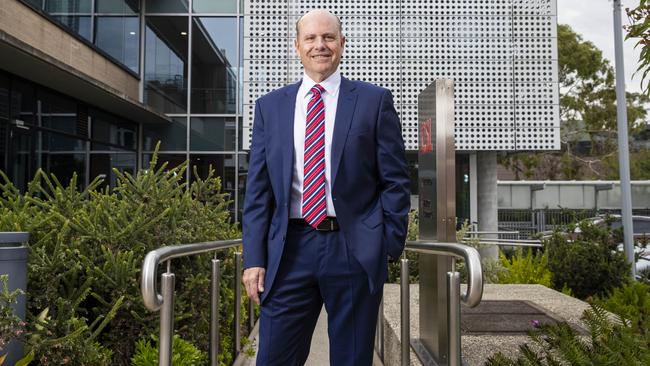‘Everything including the kitchen sink’: why CSL’s Covid immune therapy trials failed
A cocktail of experimental Covid-19 drugs, administered with CSL’s own hyperimmune therapy, blurred the effectiveness of the company’s treatment in US trials.

CSL chief executive Paul Perreault has revealed what halted the company’s research program into fighting Covid-19, highlighting the design of clinical trials rather than the effectiveness of the company’s pandemic-busting therapies.
Mr Perreault – who flew from the US to CSL’s headquarters in Melbourne for the first time in two years last week – criticised the trial process of America’s National Institutes of Health, saying Covid-19 patients waited too long to be injected with CSL’s coronavirus hyperimmune therapy.
Trial participants were also administered a cocktail of experimental drugs, including Gilead’s antiviral remdesivir, blurring what worked and what didn’t.
CSL forged a global alliance with Japan’s Takeda Pharmaceutical Co to develop an old-fashioned but potentially effective treatment to treat Covid-19. It involved extracting antibodies from the plasma of people who recovered from Covid-19 and developing it into a hyperimmune therapy to boost a patient’s immune system.
But the treatment – which won praise from former US president Donald Trump – failed to meet its endpoints. That does not mean it did not work, but CSL has abandoned the project.
“It’s one of those things where the NIH, I think, didn’t really have the right trial design because a lot of the researchers were also involved in the Gilead trial,” Mr Perreault said.
“What they should have done is given (it) to people early without additional antibodies because it was very hard to see the effect.
“But because people were worried and it was early on in Covid, they were trying to give everything including the kitchen sink, and the trial just couldn’t differentiate between what was working.
“And if you gave it too late, it’s not going to really be that beneficial because you need the immune system to be active to actually take the antibodies from a ‘hyperimmune’ and make it beneficial for the patient.
“So once Covid hit a certain level and people are hospitalised that’s probably not the time you want to give them hyperimmune. You want to give it to them early on when they’re first diagnosed.”
Mr Perreault said there could still be “some benefit” in developing a Covid hyperimmune therapy. And doctors had high hopes for such treatments, given the relatively limited arsenal they have to treat patients with severe viral respiratory infections.
But it’s unlikely to come from CSL.
“To redo that and go back, when now there are therapeutics and other things, I don’t think that’s worth our time or effort,” he said. “It (Covid therapy research) depends on where potentially we can add value or competencies.”
CSL, which is producing more than 50 million doses of the AstraZeneca Covid vaccine at its factory in Melbourne, is also unlikely to develop its own Covid jab as it turns its attention more to the next generation of influenza vaccines to prepare for the next pandemic.
The company spends more than $1bn a year on research and development on a variety of lifesaving treatments and vaccines, working in-house and closely with universities.
At the onset of Covid, it partnered with the University of Queensland to develop a coronavirus vaccine, and while it proved effective during trials, it also triggered false positive readings for HIV, prompting its abandonment.
“Will we start our own research program for a Covid-19 vaccine – probably not on our own,” Mr Perreault said.
“We have a hub and spoke model for research and the research hub is here (in Melbourne at) Bio21 where the bulk of our research is done. But we have all of these university collaborations. Then we have the tentacles to Germany, we have the tentacles to Switzerland, we have the tentacles to our US business.
“This hub and spoke is getting larger and larger in terms of our capabilities.”
CSL is building an $800m cell-based influenza vaccine factory in Melbourne that is scheduled to open in 2026. Cell-based flu vaccines do not require eggs to manufacture, enabling higher quantities to be made at shorter notice – a must in a pandemic.
The Tullamarine facility will replicate Seqirus’s influenza factory at Holly Springs, North Carolina, which has been manufacturing and stockpiling AUDENZ, the first adjuvanted, cell-based influenza vaccine designed to protect against H5N1, known as bird flu.
It is also developing its mRNA technology – which underpins Pfizer and Moderna’s Covid jabs – and hoped to build another specialised research centre and factory in Australia. But the Morrison government awarded the contract to build that factory to Moderna instead of CSL.
Mr Perreault said the company would now develop its mRNA research overseas and has fielded calls from the US, UK and Europe.
“Australia doesn’t want us as part of that, OK. In the US we have a new contract with BARDA that includes Self-Amplifying Messenger RNA (sa-mRNA). In the UK we have very strong relationships and they’re interested and when we look at Europe there’s interest there as well. So I’m not fussed from that perspective.”





To join the conversation, please log in. Don't have an account? Register
Join the conversation, you are commenting as Logout